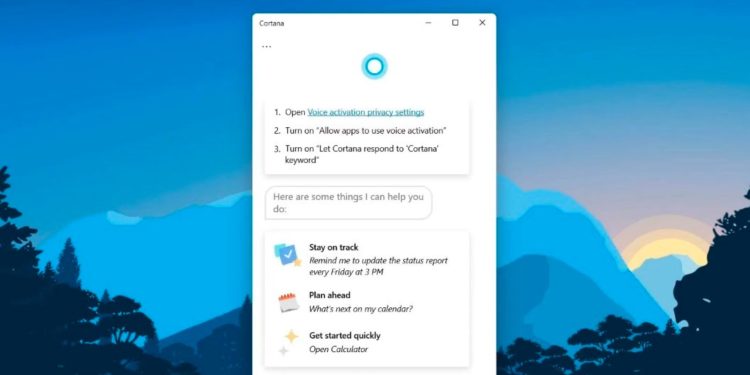Key Takeaways:
- Microsoft is gradually shutting down Cortana everywhere, its once-prominent virtual assistant for Windows phones.
- The standalone Cortana app in Windows 10 and Windows 11 will stop working soon.
- Microsoft is directing users to use Bing Chat and Windows Copilot as alternatives to Cortana.
- Cortana’s support has been reduced over the years, with the iOS and Android versions already discontinued.
- Microsoft aims to integrate Bing Chat into all its products, including Windows 11.
- Cortana may continue its role as an AI helper in the Halo franchise.
Microsoft has announced the gradual shutdown of Cortana, once a flagship feature of Windows phones. The standalone Cortana app in Windows 10 and Windows 11 is scheduled to stop working this month, as the company redirects users to Bing Chat and Windows Copilot.
Related: How to try new Bing with ChatGPT
For the time being, Cortana, an automated virtual assistant, will remain functional in Microsoft Teams and Outlook, but its days in Windows are numbered. The decision comes as Microsoft aims to integrate its new Bing Chat service, powered by ChatGPT, into all of its products, with Windows 11 incorporating it as a built-in feature starting this fall.
Read more: Microsoft unveils new Bing with new ChatGPT and Edge browser
Some users have already reported the Cortana app ceasing to function entirely after an app update. While others may still have access, a message is displayed stating that “Cortana in Windows is going away soon.”
The Redmond giant has been gradually reducing its support for Cortana, ending iOS and Android versions’ support in early 2021 and removing it from the Windows taskbar in Windows 11 shortly after.
Cortana’s journey began on Microsoft’s Windows Phone platform in the early 2010s, serving a similar purpose as Apple’s Siri and Google Now, acting as a hands-free way to interact with the phone and featuring a “cute” AI personality.
The voice assistant later arrived on desktops with Windows 10 in 2015, followed by a release on Android and iOS a few months later. However, it started losing prominence in new Windows 10 builds by 2019. No one can deny that Cortana was a bit popular and found its place among the likes of Google Now and Apple’s Siri. Regardless, it wasn’t very useful except for some quirky jokes and the ability to sing some songs.
As Cortana is going away, Microsoft is urging users to explore alternatives like Windows Copilot and the “voice access” accessibility feature in Windows 11. The latter offers speech-to-text capabilities and limited window management, even offline.
For now, Cortana will continue to be available in Microsoft Outlook and Microsoft Teams, but these versions are also likely to be replaced by new AI-driven counterparts in the future. Ultimately, Cortana may just find its primary role within the Halo franchise as an AI helper.
What do you think about this move? Would you be missing Cortana? Let us know in the comments.


![How and where to watch Apple event live ([year]) 2 2025 Apple Event live 2023](https://techtout.com/wp-content/uploads/2023/09/apple-event-live-september-2023-120x86.jpg)




![How to privately reply to a WhatsApp group message in [year] 7 2025 WhatsApp group private reply](https://techtout.com/wp-content/uploads/2020/09/moran-rvDoh9d9x5Q-unsplash-scaled-1-75x75.jpg)

![How to enable dark mode on Instagram [year] 9 2025 Instagram dark mode guide](https://techtout.com/wp-content/uploads/2023/01/dark-mode-instagram-120x86.jpg)
![Best Metal Gaming Laptops [year] 10 2025 Best metal body laptops on Amazon](https://techtout.com/wp-content/uploads/2023/05/best-metal-gaming-laptops-120x86.jpg)
![25 popular Linux distros [year] 11 2025 Most popular Linux distros in 2023](https://techtout.com/wp-content/uploads/2023/08/popular-linux-distros-120x86.jpg)
![Instagram story decoration Ideas in [year] 12 2025 A photo of a person using Instagram on iPhone, showing Instagram stories decorations](https://techtout.com/wp-content/uploads/2023/02/decorate-instagram-stories-120x86.jpg)
![10 Best Browsers for iPhone in [year] 13 2025 Best iPhones browsers](https://techtout.com/wp-content/uploads/2023/05/best-iphone-browsers-120x86.jpg)
![Top 9 lifestyle apps that will improve the quality of your life in [year] 14 2025 Lifestyle apps for IOs and Android users](https://techtout.com/wp-content/uploads/2023/07/top-lifestyle-app-120x86.jpg)


![11 Latest Instagram Tips and Tricks [year] 18 2025 high angle photo of a mobile](https://techtout.com/wp-content/uploads/2020/08/instagram-profile-scaled-1-120x86.jpg)








